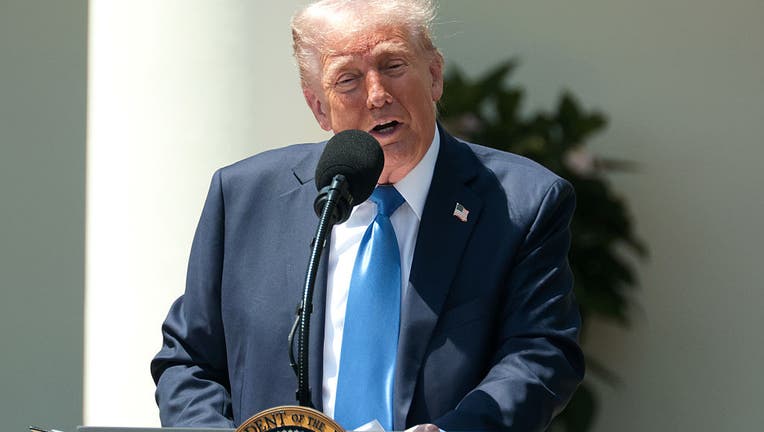Trump-appointed Texas judge rules against use of Alien Enemies Act for deportations

MAY 01: U.S. President Donald Trump delivers remarks during a National Day of Prayer event in the Rose Garden at the White House on May 1, 2025 in Washington, DC. The National Day of Prayer is a congressionally recognized observance that calls on peo
BROWNSVILLE, Texas - A federal judge in Texas has ruled against the Trump administration in its attempt to deporti a group of Venezuelans under the Alien Enemies Act.
Alien Enemies Act Ruling
What we know:
The ruling from United States District Judge Fernando Rodriguez Jr., a Trump appointee, ruled that the administration's invocation of the Alien Enemies Act (AEA) does not meet "invasion" or "predatory incursion" requirements in the law.
The Trump administration looked to use the 18th-century wartime law to deport Venezuelans they say are members of the gang Tren de Aragua. The Venezuelan citizens are currently detained at the El Valle Detention Center in Raymondville, Texas.
The president said he had special powers to deport immigrants, identified by his administration as gang members, without the usual court proceedings.
Rodriguez disagreed.
"Neither the Court nor the parties question that the Executive Branch can direct the detention and removal of aliens who engage in criminal activity in the United States," wrote the judge. "The President’s invocation of the AEA through the Proclamation exceeds the scope of the statute and is contrary to the plain, ordinary meaning of the statute’s terms."
The ruling comes after a lawsuit filed by the American Civil Liberties Union and ACLU of Texas.
It is the first formal permanent injunction against the Trump administration using the Alien Enemies Act.
The case is just one of several filed against the Trump administration over the AEA.
What we don't know:
The Trump administration is likely to appeal the ruling, but it is not clear what steps it will take.
In previous cases challenging presidential power, they could ask appellate courts, including possibly the U.S. Supreme Court to ask for an emergency stay.
What they're saying:
"Congress never meant for this 18th-century wartime law to be used this way. This is a critically important decision that prevents more people from being sent to the notorious CECOT prison," said ACLU attorney Lee Gelernt after the ruling.
This permanent injunction is a significant win for preventing unlawful, unilateral executive action that has been stoking fear across Texas, especially within border communities. Immigrants are, and always have been, an integral part of this state and nation. They, too, are protected by U.S. laws and the Constitution," said Adriana Piñon, legal director of the ACLU of Texas.
What is the Alien Enemies Act?

PREVIOUS STORY: Supreme Court blocks deportation of Venezuelans
The Supreme Court has temporarily blocked the Trump administration's attempt to deport hundreds of Venezuelan men to El Salvador under the Alien Enemies Act, leaving their fate uncertain.
The backstory:
The Alien Enemies Act allows the president to detain, relocate or deport non-citizens from a country that is considered an enemy of the United States during wartime.
Congress passed the Alien Enemies Act as part of the four Alien and Sedition Acts of 1798 when the U.S. was about to go to war with France.
The law requires a formal declaration of war before it can be used, but Trump appears to have invoked the law without such declaration. The sweeping authority of the Alien Enemies Act may sidestep a law that bans the military from civilian law enforcement.
The Alien Enemies Act has only been used three times before in U.S. history, including the War of 1812 and during World War II when it was used to intern Japanese-Americans.
Fernando Rodriguez Jr.
Dig deeper:
Fernando Rodriguez Jr. is currently a judge in the United States District Court for the Southern District of Texas in Brownsville.
Rodriguez received a Bachelor of Arts from Yale and his juris doctorate from the University of Texas.
He was nominated to fill the seat by President Trump in Sept. 2017.
Rodriguez was confirmed for the role in 2018.
The Source: Information on the ruling comes from the Associated Press, the ACLU and documents from the United States District Court for the Southern District of Texas. Information about judge Fernando Rodriguez Jr. comes from the Federal Judicial Center.

